"Charades"
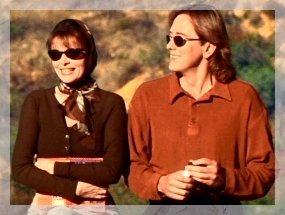
A review by Jenni:
I should probly disclose that I didn't pay as much attention during
this episode as I should have. During it I suddenly felt I *had*
to switch purses right then. Not surprisingly this hit me after
most of Andrew's scene were done. So I was a little distracted
and may have missed some finer points.
What I love about this
episode:
It
gives us a pretty interesting glimpse into the dynamics between Andrew,
Monica, and Tess. At the start Andrew's almost fatherly towards
Monica. He makes sure she's wearing sunscreen. He then says
that Tess told him to keep an eye on Monica. My fellow JABBers
are likely recognizing this as good evidence for our "Andrew as
equivalent to firstborn child" theory. Definitely. But
stranger still he described himself as a "stand-in" for Tess.
That makes him seem less like Monica's peer and more like Tess'.
It's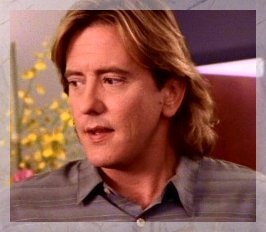 just
interesting and maybe another reason I was a lil distracted
through out. There's just so much to think about!
just
interesting and maybe another reason I was a lil distracted
through out. There's just so much to think about!
I think the blacklist was a great plot element. It's something
people are familiar with for the most part. But I don't think it
was a very predictable choice from the TBAA writers. Watching
this I wondered if maybe it was in the wake of the Elia Kazan Oscar
controversy. But that was 1999 and this episode aired in
1997. So I don't know what inspired this episode but I found it
really informative. Andrew's scenes, in particular, were a good,
very basic lesson on the blacklist. They made me want to learn
more and most anything that prompts people to learn is good! It
also
made me think a lot about our own times but more on that later.
I like that this episode was very much about restoring a name, giving
proper credit to a name, and the heartache that comes with losing one's
name (as Budd does when his film credit becomes "Charlie
McCarthy.") Names tend to get taken for granted. It made me
wonder if there really was a campaign in Hollywood to restore blacklist
victims' credits. Apparently this is something the Writers Guild
is still working on. You can learn about that at Corrected
Blacklist Credits from the Writers Guild of America.
I think Tess' charade "God loves you" to younger Libby is very sweet
and that it gets reprised with an older Libby really brings 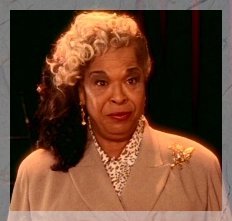 great
closure to this episode.
great
closure to this episode.
Tess also gets to voice a quote here that I really love: "Love is never
really lost and you can always find it again through God because He
loved you first and best."
What I didn't love about this
episode:
HUAC. Obviously
it's bad that they ruined people's lives, turned friends against each
other, and generally betrayed their role as representatives of a
democracy. But then in this episode they're also taking creepy
photos of people's intimate activities. Shudder.
I'm not crazy about the "frozen people" phenomenon. During the
revelation on stage the entire audience is frozen. I get that
it'd look awfully crazy to have Libby, Clive, and Vera talking to thin
air. I also know two glowing women on the stage would cause
pandemonium in the theatre. Nonetheless, it makes me a little
paranoid. Maybe it's true... And maybe angels have frozen
us countless times... You could be frozen right now...
BOO! Sorry, it's almost Halloween. But really this is one
of my least favorite angelic/divine powers demonstrated on the show.
I don't like how Andrew just disappears. I know I'm being partial
but... I missed him. On the other hand, I can see a sort of
reasoning to it. I already said Andrew seems fatherly in this
episode. Caring for Monica, teaching her things she doesn't know,
and seeming so much older and wiser. This is also an episode
about
two women coming to terms with their past. So there is a balance
to having the episode come down to Vera and Libby as the main humans
and Tess and Monica as the main angels. 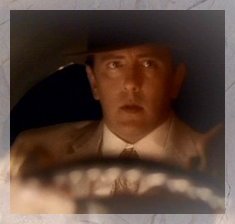 Which
makes it all the
more apropos that Budd and Andrew share the same final scene.
Monica has to carry what an unseen Andrew taught her with her to help
Libby remember what the unseen Budd taught her. But I still
missed Andrew...
Which
makes it all the
more apropos that Budd and Andrew share the same final scene.
Monica has to carry what an unseen Andrew taught her with her to help
Libby remember what the unseen Budd taught her. But I still
missed Andrew...
Lingering questions:
Why was Vera not suspected by the Committee if her husband was?
Or was she just not called in after his suicide cause it shamed the
Committee? I just found that a little odd. It seems to me
the wife would be an obvious target if the husband didn't provide the
desired answers. But then maybe looking for logic amongst such a
shameful, self-righteous, harmful group is a big exercise in futility.
What's a sprocket? It's one of those words you hear but I have no
idea what it actually is. But here Andrew tells Monica to watch
out for them while she's preparing the home video reel.
What did the audience think of Libby suddenly sobering up? I mean
she's all slurry and weird. Then they get frozen (which I assume
they do not notice) and when they're unfroze she's emotional but not at
all drunk seeming. Huh.
Parts that made me feel
swoony:
Andrew's not in this terribly much but he's pretty darn adorable at the
start when he's taking care of Monica.
He's also so impressive during the scene in Budd's car. You
realize that sometimes AODs not only need to comfort their assignment
but also the angel whose case they're claiming. I love how he
squeezes Tess' shoulder when he tells her he needs to take over.
Andrew's empathetic. He knows that Tess is upset about not saving
Budd from himself. Andrew proves that it is possible to reach out
to fellow angels without neglecting one's assignment. Take notes,
Monica.
Random thoughts:
As I'm writing this we're in the final stages of a presidential
election here in the States. And one of the main bones of
contention during one
debate was an argument about the past.
Should we not focus so much on it? Or is the past really prologue
in 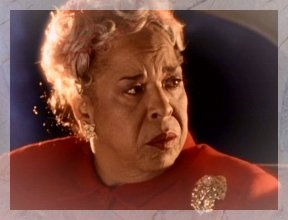 which case
not focusing on it could be really hazardous?
So
between that and some recent personal incidents, I've been debating
that. This episode fits in really well with that question.
What I took from this episode is that the past isn't even ever really
over. Libby described herself as a "child of the
blacklist." It's so important to her she demands Monica learn
about it. Every modern day scene in this episode is intrinsically
tied to what happened during the blacklist. And thinking about
the Kazan Oscar, I can remember watching that year and seeing some
actors who weren't even alive in the 1950s refusing to stand up and
clap for the man. And others doing so enthusiastically.
Clearly the past wasn't over for those people. It was inside
them. So I don't think there's any point in squabbling over how
important the past is. It's so wrapped up in who we are that even
if we want to shift focus I don't think we can. We're products of
not only our own past but the universal past. Hopefully, like
Libby eventually does, we make the best of that.
which case
not focusing on it could be really hazardous?
So
between that and some recent personal incidents, I've been debating
that. This episode fits in really well with that question.
What I took from this episode is that the past isn't even ever really
over. Libby described herself as a "child of the
blacklist." It's so important to her she demands Monica learn
about it. Every modern day scene in this episode is intrinsically
tied to what happened during the blacklist. And thinking about
the Kazan Oscar, I can remember watching that year and seeing some
actors who weren't even alive in the 1950s refusing to stand up and
clap for the man. And others doing so enthusiastically.
Clearly the past wasn't over for those people. It was inside
them. So I don't think there's any point in squabbling over how
important the past is. It's so wrapped up in who we are that even
if we want to shift focus I don't think we can. We're products of
not only our own past but the universal past. Hopefully, like
Libby eventually does, we make the best of that.
Back
to the Episode Guide
(The photographs used on this
page are from "Touched by an Angel" and
owned by CBS Productions, Caroline Productions, and Moon Water
Productions. They are not being used to seek profit.)


 just
interesting and maybe another reason I was a lil distracted
through out. There's just so much to think about!
just
interesting and maybe another reason I was a lil distracted
through out. There's just so much to think about! great
closure to this episode.
great
closure to this episode. Which
makes it all the
more apropos that Budd and Andrew share the same final scene.
Monica has to carry what an unseen Andrew taught her with her to help
Libby remember what the unseen Budd taught her. But I still
missed Andrew...
Which
makes it all the
more apropos that Budd and Andrew share the same final scene.
Monica has to carry what an unseen Andrew taught her with her to help
Libby remember what the unseen Budd taught her. But I still
missed Andrew... which case
not focusing on it could be really hazardous?
So
between that and some recent personal incidents, I've been debating
that. This episode fits in really well with that question.
What I took from this episode is that the past isn't even ever really
over. Libby described herself as a "child of the
blacklist." It's so important to her she demands Monica learn
about it. Every modern day scene in this episode is intrinsically
tied to what happened during the blacklist. And thinking about
the Kazan Oscar, I can remember watching that year and seeing some
actors who weren't even alive in the 1950s refusing to stand up and
clap for the man. And others doing so enthusiastically.
Clearly the past wasn't over for those people. It was inside
them. So I don't think there's any point in squabbling over how
important the past is. It's so wrapped up in who we are that even
if we want to shift focus I don't think we can. We're products of
not only our own past but the universal past. Hopefully, like
Libby eventually does, we make the best of that.
which case
not focusing on it could be really hazardous?
So
between that and some recent personal incidents, I've been debating
that. This episode fits in really well with that question.
What I took from this episode is that the past isn't even ever really
over. Libby described herself as a "child of the
blacklist." It's so important to her she demands Monica learn
about it. Every modern day scene in this episode is intrinsically
tied to what happened during the blacklist. And thinking about
the Kazan Oscar, I can remember watching that year and seeing some
actors who weren't even alive in the 1950s refusing to stand up and
clap for the man. And others doing so enthusiastically.
Clearly the past wasn't over for those people. It was inside
them. So I don't think there's any point in squabbling over how
important the past is. It's so wrapped up in who we are that even
if we want to shift focus I don't think we can. We're products of
not only our own past but the universal past. Hopefully, like
Libby eventually does, we make the best of that.